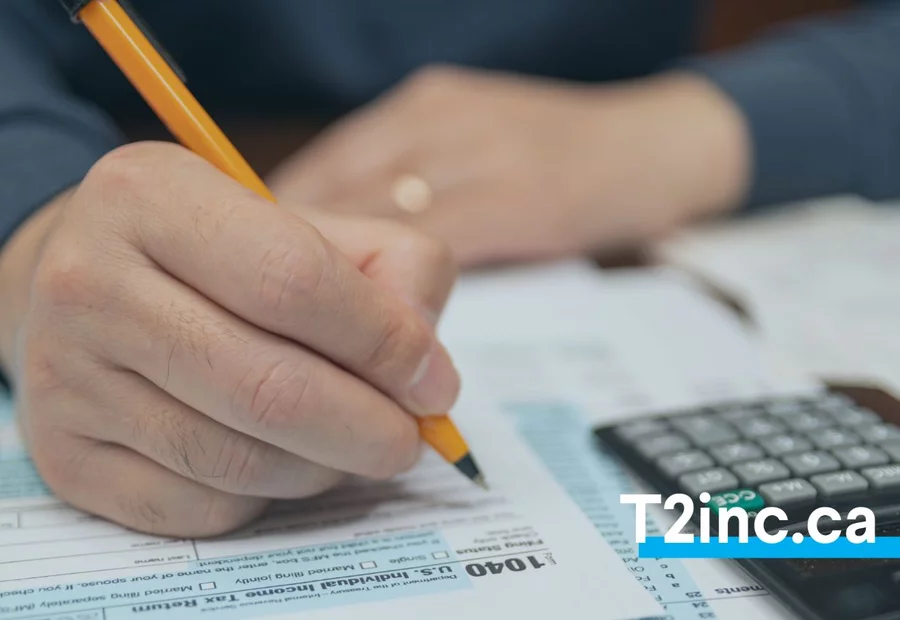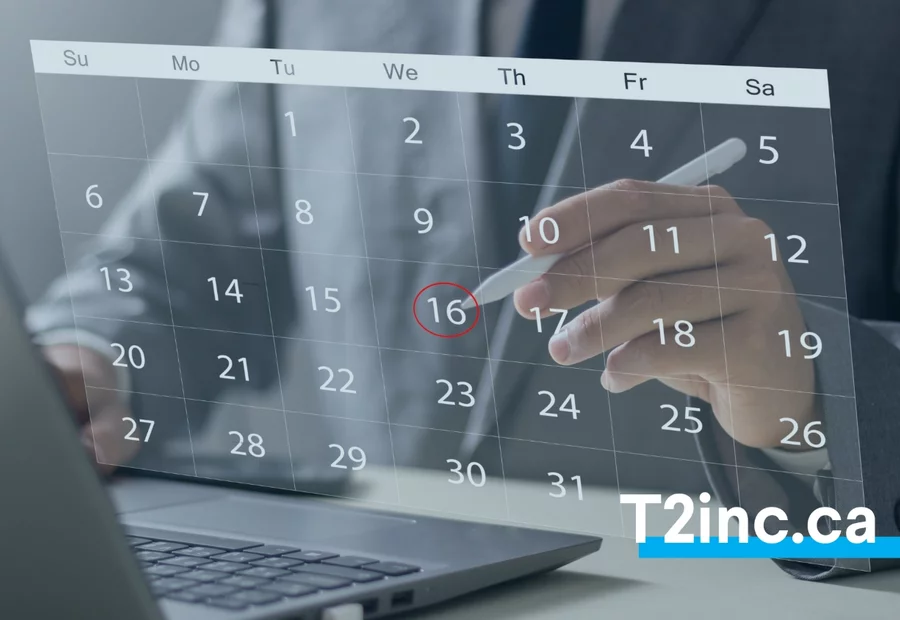Late filing corporate tax return: All you need to know about interest and penalties

Have you ever experienced a delay in submitting your business taxes? If so, you know how stressful, and costly, it can be. Depending on the amount of tax due, a single oversight could cost your company hundreds or even thousands of dollars. It’s more common than you might think: over a quarter of Canadian SMEs say they struggle to meet their tax obligations on time each year.
Whether it's at the federal level with the Canada Revenue Agency (CRA) or at the provincial level with Revenu Québec, the rules are clear: a delayed submission or missed payment will lead to sanctions and interest charges.
The good news? There’s always a way to regain control. With a solid understanding of your responsibilities under the Income Tax Act and the right systems in place, you can avoid unnecessary costs and headaches. Whether you’re already behind or worried it might happen soon, here’s everything you need to know about late corporate tax returns: penalties, key deadlines, interest on unpaid tax balances, and most importantly, how to avoid them.
What is the interest and penalty for filing corporate taxes late?
Submitting your corporation income tax return past the deadline is never a good idea. It’s a costly mistake, both financially and reputationally. Beyond the added charges, it can harm your credibility with banks, partners, or clients.
That’s why it’s essential to file your corporate tax return on time, even if your business had no activity during the year. Many entrepreneurs mistakenly think they don’t need to file if there’s no income, but that’s false. Regardless of your business status, the CRA and Revenu Québec expect all companies to submit their tax information on corporation tax by the required due date.
As a CPA and tax advisor, I meet business owners every year who realize, sometimes too late, the impact of a missed return. What starts as a simple oversight can snowball into a cash flow issue or delay a major project.
And remember, if your corporation is inactive, you’re still legally required to file a corporate tax return. Failing to do so may result in a late submission penalty, just like for an active company.
Penalties and interest for late filing: how much can it cost?
Even a minor corporate tax delay can lead to substantial costs. As soon as your return is submitted late, or your balance isn’t paid on time, the CRA and Revenu Québec can impose penalties and charge interest.
Here’s how these charges work:
- Late filing penalty: 5% of the unpaid balance as soon as the return is late, plus 1% of that balance for each full month the return is late, up to a maximum of 12 months. This is commonly referred to as the failure to file penalty.
- Compound daily interest: The applicable interest rate changes quarterly. In 2025, the CRA charges around 10%, while Revenu Québec’s rate is about 9%. These are compounded, which means interest is charged on top of previous interest and penalties.
For example, if your corporation owes $10,000, and you submit your corporate income tax return after 4 months, the late filing penalty could exceed $700, before any interest is added. Imagine the total after 8 or even 10 months…
And here’s a crucial point: if your corporation has been late at any time over the previous three previous tax years, the CRA may double the monthly penalty rate. This additional penalty significantly increases the total cost for repeat late filers.
Is it possible to avoid or reduce these penalties?
Yes, if your delayed corporate tax return is due to exceptional circumstances, such as a serious illness, natural disaster, or another situation beyond your control, you may be eligible to request a cancellation or reduction of the penalties and interest charges.
That said, this type of relief is never automatic. You’ll need to make a formal request, clearly explain your situation, and provide supporting documents.
Each case is reviewed individually. To increase your chances, be as transparent and detailed as possible. Tax authorities will assess your credibility, and the more compelling and complete your file, the more likely your request will be approved.
What deadlines should I remember to avoid late corporate tax filing penalties with the CRA and Revenu Québec?
If you want to avoid paying penalties and interest for a delayed business tax return, the first step is simple: know your deadlines. Too many small business owners rely on memory or last-minute reminders. But the filing due date and payment deadlines are fixed, and they won’t wait for you.
Missing just one key date can lead to significant consequences. And unlike your phone provider, the CRA doesn’t send friendly warnings, they apply penalties automatically.
At T2inc.ca, we help our clients avoid these costly mistakes by sending timely reminders for their corporate income tax deadlines — whether federal (T2) or provincial (CO-17).

T2 Return — Canada Revenue Agency
All incorporated businesses in Canada, including inactive corporations with no income or expenses, are required to file a federal corporate income tax return. This return, known as the T2 tax return, must be submitted within six months of the end of your company’s fiscal year.
For example, if your fiscal year ends on December 31, 2024, you have until June 30, 2025 to file your T2 return. If your fiscal year ends on June 30, 2025, the deadline is December 31, 2025.
Federal corporate tax payment deadline
If your company has corporate tax to pay at the end of its fiscal year, in addition to any installment payments made throughout the year, the Canada Revenue Agency (CRA) gives you a limited time to pay your remaining balance.
Generally, the corporate tax payment must be made within two or three months after your year-end, depending on whether your company qualifies for the small business deduction as a Canadian-Controlled Private Corporation (CCPC).
While the filing due date for your T2 return is six months after the fiscal year-end, the payment due date comes earlier, and it doesn’t move. If the balance owing is not paid on time, the CRA may charge interest and impose penalties, calculated based on each full month the payment is overdue.
CO-17 return — Revenu Québec
If your business is located in Quebec, you must submit a provincial corporate tax return in addition to the federal T2 return. This is the CO-17 return, required by Revenu Québec.
Just like the federal return, the CO-17 must be submitted every year, whether your company is active or inactive. You’re required to file your return within six months of your fiscal year-end.
For example, if your fiscal year ends on March 31, 2025, the deadline for submitting your CO-17 is September 30, 2025. If your year ends on October 31, 2025, you must complete your submission by April 30, 2026.
Quebec corporate tax payment deadline
While you have up to six months to file your CO-17 return, the payment deadline for your corporate income tax is much sooner. Most businesses must pay the balance owing within two months following the end of their fiscal year.
Failing to respect this due date means your company is immediately considered in default, even if the return itself is submitted on time. As a result, Revenu Québec will impose interest and penalties, which continue to accumulate each month until the full amount owing is paid.
This is why it’s crucial to plan ahead, not only for your filing deadline, but also for the exact tax payment due date, to avoid any penalties for late payment or unnecessary interest charges.
Late business taxes: what to do
An oversight, lack of time, or a tough financial year… Whatever the reason, if your corporate income tax return is overdue, don’t freeze up. Every day that passes makes the situation worse, but nothing is irreversible. The key is to take action now.
File your corporate tax return, even if you can’t pay
This is rule number one: submit your corporate income tax return, even if you can’t pay the full balance right away.
Why? Because the penalty for a delayed filing is often higher than the interest on unpaid tax. By submitting your T2 return or CO-17 return quickly, you avoid the automatic penalty for late filing, even if your balance remains unpaid for now.
It’s also important to know: both the CRA and Revenu Québec prefer working with a company that files on time and pays later, rather than one that stays silent and inactive.
The good news? The sooner you act, the easier it is to manage the situation and limit the interest and penalties on your corporate tax.
Negotiate a payment plan with the CRA or Revenu Québec
If you owe corporate taxes and can’t pay the full amount, you may be eligible for a payment arrangement with the CRA or Revenu Québec. Many businesses don’t realize this option exists, yet it’s one of the most effective ways to reduce the pressure of a delayed corporate tax return.
Here’s how it works:
- You contact the CRA or Revenu Québec.
- You propose a realistic payment plan — usually monthly installments.
- If your request is well-supported, it’s typically accepted without further collection action.
That being said, interest continues to accrue for each month the balance remains unpaid. That’s why it’s essential to pay down your balance as soon as possible. And if you’ve faced exceptional circumstances (like illness, fire, or financial hardship), you may even qualify for penalty relief or interest relief.
Outsource your tax affairs to professionals
Managing your corporation tax obligations isn’t always your top priority, and that’s completely understandable. Between deadlines, complex forms, and the risk of mistakes that lead to corporate tax interest and penalties, staying compliant can be a real challenge. That’s exactly why we created T2inc.ca.
By entrusting your annual filing (T2 and CO-17) to our certified public accounting firm and corporate tax specialist, you:
- Avoid delays and oversights
- Reduce the risk of costly errors
- Free up time for what really matters: your operations and your growth.
And the best part? In many cases, the cost of our services is less than a single penalty for late filing. On top of that, you get personalized tax planning to help you optimize your corporate structure and reduce your tax burden year after year, legally and efficiently.
Set up a simple, effective tax routine
If you prefer to manage your corporate taxes internally, that’s totally possible, as long as you stay organized. A solid routine can help prevent delays and eliminate the stress of last-minute submissions.
Here are some practical tips to help you stay ahead of your tax deadlines:
- 📅 Record your filing and payment deadlines as soon as your fiscal year ends — including T2, CO-17, and any instalment payments due throughout the year.
- 🔁 Set monthly or quarterly reminders to track your compliance — especially important if your company must remit payroll deductions or GST/QST.
- 📁 Store all accounting documents digitally in a well-organized folder — on Google Drive, Dropbox, or a secure accounting platform.
- 🤝 Book a yearly check-in with your CPA or tax specialist, even if it’s just for a quick review.
The goal? To make corporate tax compliance a routine task, not a source of panic every spring. When your deadlines are clear and your documents are ready, you’re far less likely to incur interest and penalties for late submissions.
T2inc.ca helps you file your overdue corporate tax return
Filing your corporate income tax return late can happen to anyone. At T2inc.ca, we see it every week: a busy entrepreneur, an unreachable accountant, a tougher financial year than expected… and suddenly, you’re behind on your tax obligations or have missed a payment
Here’s what you need to remember:
- The longer you wait, the more it costs.
- The faster you act, the easier it is to fix.
So if you're already behind, or worried that you might be this year, don’t wait for the late filing penalties and interest to pile up. Even if you don’t have all your documents yet. Even if you're several years behind.
Contact us today, and we’ll help you get back on track with your late corporate tax return, whether it’s your T2, CO-17, or both.
FAQ — Business tax arrears
Can I avoid penalties if I'm late for the first time?
Technically, no. The CRA and Revenu Québec apply a late filing penalty from the very first day of delay. However, in some cases (serious illness, natural disaster, or death), it’s possible to request a waiver. You’ll need to clearly document your situation and prove that it was beyond your control.
How long does it take to resolve a late corporate tax return?
It depends. If you’re only behind for one fiscal year, it can sometimes be resolved in just a few days. But if you have multiple years of missed filings or incomplete bookkeeping, it may take a few weeks. One thing is certain: the sooner you start, the faster it gets resolved.
Do I need to file a return if my company didn’t make any income this year?
Yes. Even if your company had no revenue or expenses, you're still required to submit a corporate income tax return. Skipping this step can still result in penalties for late submission, even for inactive businesses.
Can T2inc.ca help me file a late corporate tax return?
Absolutely — it’s our specialty. We file hundreds of corporate returns each year, including urgent and complex cases. Simply fill out our secure online form, and we’ll contact you with a personalized, simple, and fast solution to take care of your late return.
Contact our experts
Have a question? Need help? Fill out our online form to get help from our experts.
Contact usNeed more help?
Contact us by filling out our form
Are you interested in our services, but would like more information before taking the plunge? Contact us today and one of our tax accountants will be in touch to help you.
At T2inc.ca, we're committed to helping business owners manage their company's tax affairs so they can grow their business.




